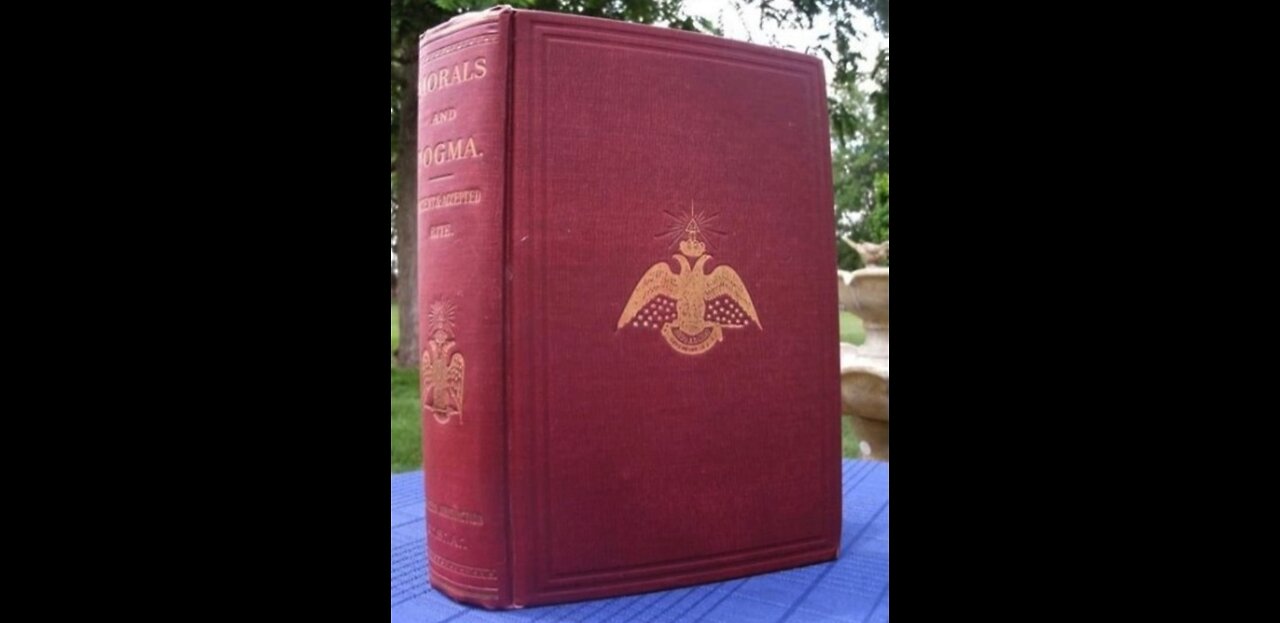Premium Only Content

Manly P. Hall Lectures on the Studies of Morals & Dogma by Albert Pike (Complete)
Lectures in this video:
1. Mystery of the Ineffable Name of God.
2. Sacred Tradition and the Aryas.
3. Secret Language of Symbolism.
4. Wisdom Religion in Persia.
5. Restoration of Ritualistic Instruction.
The 19th and 20th centuries saw the emergence of two remarkable figures in the world of esoteric philosophy and Freemasonry: Albert Pike (1809-1891) and Manly P. Hall (1901-1990). Despite living in different eras, their extensive works on Freemasonry and esoteric philosophy have left a significant impact that continues to reverberate in the present day.
Albert Pike, a prominent American Freemason, authored the seminal work “Morals and Dogma of the Ancient and Accepted Scottish Rite of Freemasonry” in 1871. This comprehensive tome outlined the teachings and beliefs of the Scottish Rite of Freemasonry, providing a profound insight into the esoteric, philosophical, and religious themes tied to the order. Born in Boston, Massachusetts, Pike's foray into Freemasonry began in 1850 in Little Rock, Arkansas. His rapid ascendancy within the ranks underscored his commitment and understanding of Masonic philosophies and rituals. Beyond his Masonic involvement, Pike's life was marked by his service as a Brigadier General for the Confederate Army during the American Civil War and a career in law and journalism. Despite his varied contributions, his enduring legacy predominantly rests upon his involvement with Freemasonry and his authorship of “Morals and Dogma,” a work that continues to influence Masonic thought.
In contrast, Manly P. Hall, born in Peterborough, Ontario, Canada, made his mark in the 20th century as a celebrated author, lecturer, astrologer, and mystic. At the age of 27, he published the magnum opus, “The Secret Teachings of All Ages,” in 1928, offering a comprehensive exploration into a myriad of topics, including ancient religions, secret societies, philosophy, and the occult. Hall’s career was characterized by his unyielding quest for knowledge and understanding across diverse disciplines. Over seven decades, he delivered over 8,000 lectures in the United States and abroad, synthesizing religious, philosophical, and historical research. In 1934, Hall established the Philosophical Research Society in Los Angeles, providing a venue for the exploration of religion, philosophy, and science. Despite the absence of formal education beyond high school, Hall's self-guided learning and intellectual curiosity established him as a respected voice in esoteric and philosophical thought.
Both Hall and Pike, despite the temporal gap, contributed substantially to the understanding of Masonic and esoteric symbols, history, and philosophies. Hall, with his exploration of global esoteric traditions, and Pike, with his focus on the Scottish Rite’s philosophies and rituals, provided enduring insights into the complexities of philosophical and spiritual thought across different cultures and eras. They authored foundational texts that illuminated the intricate world of Freemasonry and esoteric philosophy, offering readers and scholars a detailed guide into these enigmatic realms.
However, the intertwining legacies of Hall and Pike are not marked by direct interaction or collaboration. There is no historical evidence to suggest that they ever met or corresponded, given the considerable time gap between their active years. Yet, in their separate capacities, both figures ardently explored and elucidated the philosophical, spiritual, and moral dimensions of Freemasonry and related esoteric traditions. Their shared commitment to intellectual and spiritual exploration forged a subtle bond that transcends their distinct historical contexts.
In their writings, Hall and Pike demonstrated a robust understanding of ancient, mystical, and symbolic traditions. Their works continue to serve as valuable resources for those venturing into the realms of Freemasonry, esoteric philosophy, and comparative religion, offering a wealth of knowledge and insight into these multifaceted disciplines. Despite the absence of a personal or direct professional relationship, Hall and Pike's intellectual legacies remain intertwined within the broader tapestry of esoteric and philosophical exploration, each echoing the other's quest for understanding and illumination.
Albert Pike and Manly P. Hall stand as towering figures in the field of esoteric philosophy and Freemasonry, their works and thoughts continuing to guide, inform, and influence contemporary explorations within these domains. The endurance of their intellectual contributions highlights their profound impact on the philosophical, religious, and esoteric thought of the 19th and 20th centuries. Their separate yet complementary legacies continue to weave through the intricate worlds of Freemasonry and beyond, underscoring their respective roles as luminary guides in the exploration of life's deeper, esoteric dimensions.
Thank you for paying attention.
-
 1:16:34
1:16:34
Deus Meum Que Jus
14 days agoWalter Martin - Occult New Age Movement
309 -
 LIVE
LIVE
Boxin
1 hour agoGrounded! part 5
152 watching -
 2:10:12
2:10:12
Badlands Media
1 day agoDevolution Power Hour Ep. 383: Epstein, Durham, and the Dictator Narrative
100K83 -
 2:40:10
2:40:10
DLDAfterDark
12 hours ago $0.51 earnedDLD Live! Feat. Red Dawn Readiness! Glock FRT's - Striker Fire Safety Concerns - ACE Trigger
46.4K8 -
 2:40:21
2:40:21
BlackDiamondGunsandGear
11 hours agoAre ALL Striker Fired Pistols UNSAFE? // After Hours Armory
56.8K16 -
 LIVE
LIVE
TheSchleppy
6 hours ago✨TheSchleppy✨EWC COUNTER STRIKE 2 GRAND FINAL *MONGOLZ v AURORA*
48 watching -
 6:34:50
6:34:50
SpartakusLIVE
15 hours ago#1 Saturday Spartoons on RUMBLE PREMIUM
131K7 -
 1:04:59
1:04:59
Man in America
16 hours ago“Summoning the Demon” — The AI Agenda Is FAR WORSE Than We Know w/ Kay Rubacek
67K49 -
 2:16:48
2:16:48
Tundra Tactical
14 hours ago $0.15 earned🎯💥 The World’s Okayest Gun Show 🔫😂 | LIVE Tonight on Rumble!
49.2K1 -
 3:36:03
3:36:03
Mally_Mouse
1 day ago🌶️ 🥵Spicy BITE Saturday!! 🥵🌶️- Let's Play: Tower Unite!
70.2K3